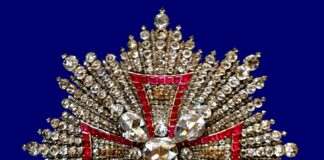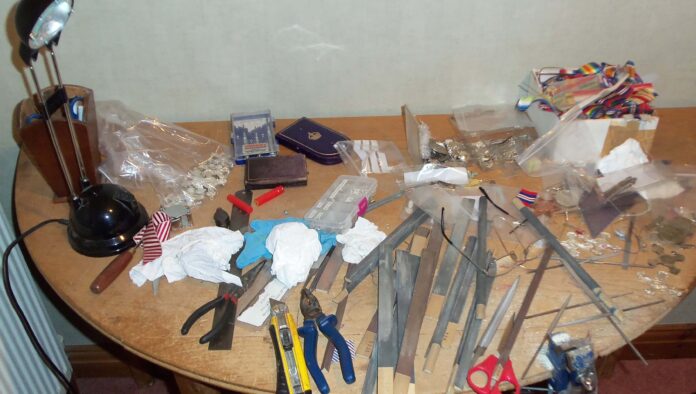
Running a fraudulent business, supplying a poppy pin badge that was in breach of a trade mark held by the Royal British Legion, and having in his possession for supply, badges with the poppy emblem in breach of a trade mark. These were the charges admitted by Henry Lyttel, aged 29. His actions were related to his business, Croft Militaria Ltd, which he ran from his home address.
At Derby Crown Court (on Tuesday 9 June 2020), Judge Jonathan Bennett sentenced Lyttel to 2 years in prison, suspended for 18 months, and ordered him to carry out 100 hours of unpaid work in the next 12 months for his crimes. He was also disqualified from acting as a director of a company for 5 years and had a curfew imposed for 6 months.
Judge Bennett said that Lyttel was ‘responsible for a sophisticated and professional operation’, was ‘motivated by dishonesty and money’, and had ‘exploited the heroism and gallantry of soldiers’. He added that Lyttel had ‘made profit by exploiting the good work of the Royal British Legion and the good causes they support’.
Trading standards officers began investigating Lyttel and his company in 2016 following complaints from medal collectors across the country.
Complaints received were that Lyttel, who had a company website and was trading online as ‘badgeman2005’, was selling fake gallantry medals and military badges, including Military Crosses and Distinguished Flying Crosses, along with pin badges bearing the poppy emblem, which is trademarked by the Royal British Legion.
Trading standards officers subsequently carried out test purchases via eBay.
Experts in military awards, including military historian and medal expert Mark Smith (MA OMRS), examined the medals, and a poppy pin badge was examined by the Royal British Legion, to establish whether or not they were fake.
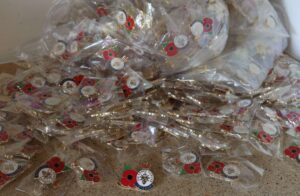
After examining the poppy pin badge, the Royal British Legion (RBL) said the poppy pins infringed their registered trade mark and that by selling badges that were unauthorised, the company would be making a profit at the expense of a charity set up to raise funds for ex-servicemen and their families. The RBL also confirmed that Croft Militaria Ltd was not authorised to use the poppy emblem and had never made any contribution to the charity.
As the complex investigation continued, trading standards officers established that Lyttel had purchased medal collections from auctions where a set of medals attributed to an Officer were for sale.
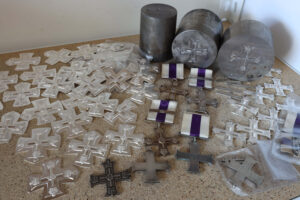
He would research the Officer and find that they had been awarded a particular award for gallantry, such as a Military Cross, but the actual medal was not included in the set for sale.
The missing medal would then be manufactured and aged to vastly inflate the value of the set of medals. One example found was for a collection of 6 medals sold to Lyttel at an auction for £320 in February 2016.
The listing showed that the recipient of the medals was also awarded a Distinguished Flying Cross (DFC) but that medal was not part of the lot being auctioned. The subsequent eBay listing from Croft Militaria Ltd shows the same medal set with a Distinguished Flying Cross added and the price listed was £2,500, a profit of £2,180.
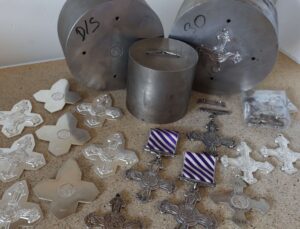
When trading standards officers searched Lyttel’s address they found a large scale and sophisticated operation set up to manufacture military medals such as the ones being sold via eBay.
Dies for striking blank copy medals, struck but unfinished medals and materials to age and distress the medals being made were seized along with a large number of poppy pin badges.
Gallantry medals that were being sold by the company were not being described as copies or replicas and were being manufactured from genuine materials, such as silver, and struck in an identical process to that which would be used by the Royal Mint. They were then being treated which oxidising chemicals to make them look very old, giving them the outward appearance as being from around the time of the First and Second World Wars. The high prices the medals were marketed at also gave the impression that they were the genuine articles.
Trading standards officers, working with military medal experts, estimated that Lyttel’s business made in excess of £72,000 in sales of fake medals and around £10,000 in the sale of fake poppy pin badges.
Proceeds of crime proceedings will now be started to try to recover the money made by Lyttel and Croft Militaria Ltd.
In Minnesota a coin dealer was recently sentenced to 30 months in prison for his fraudulent scheme of selling counterfeit coins.




